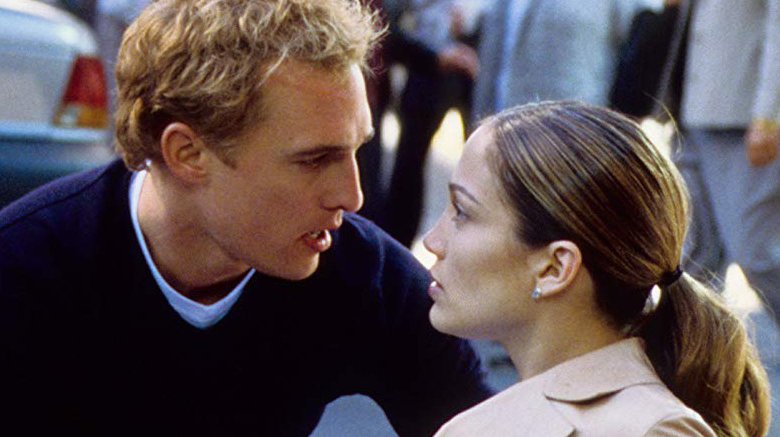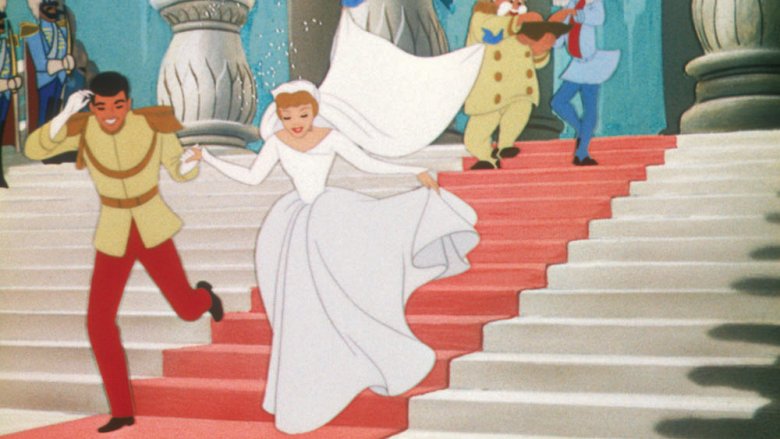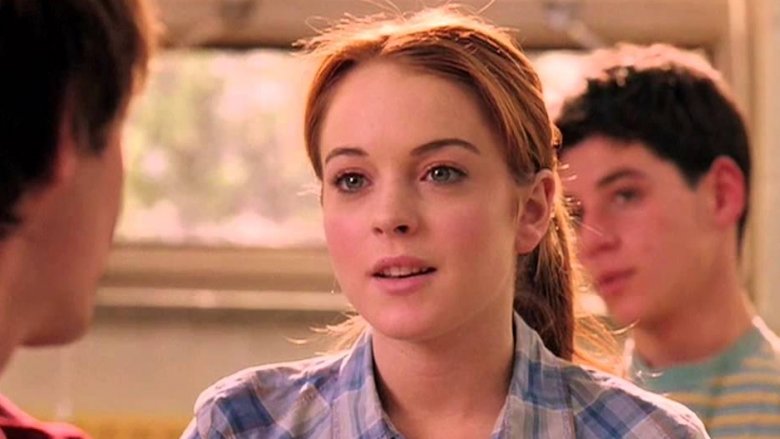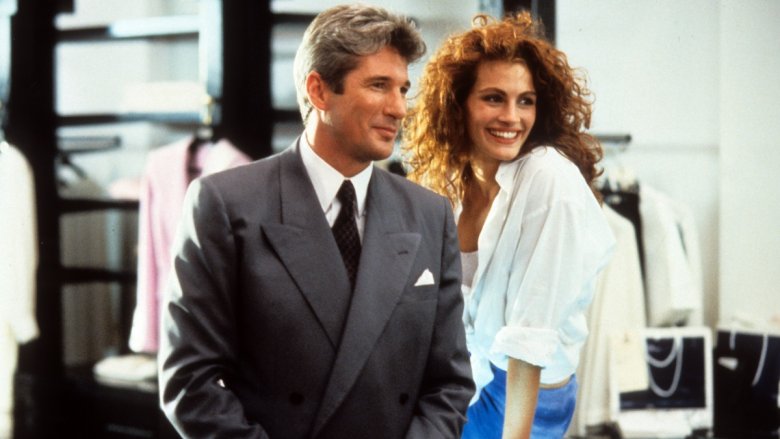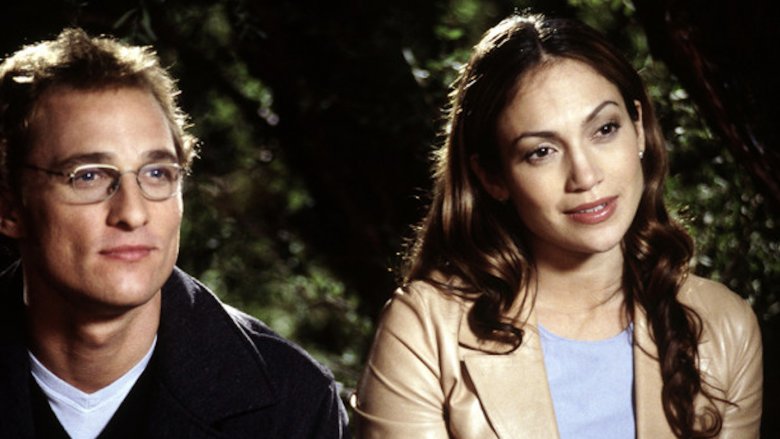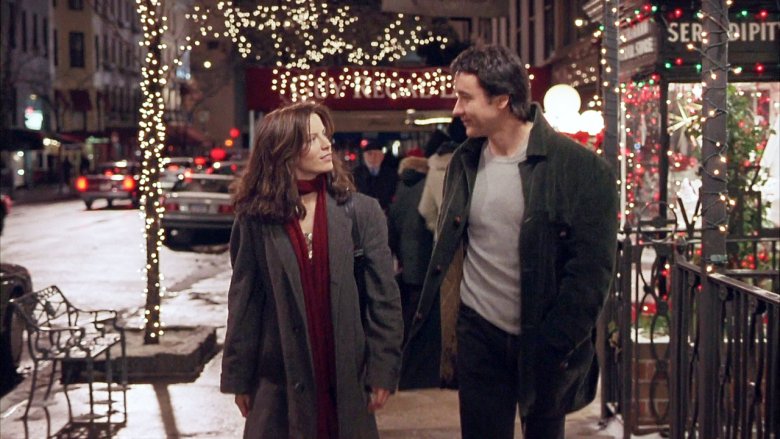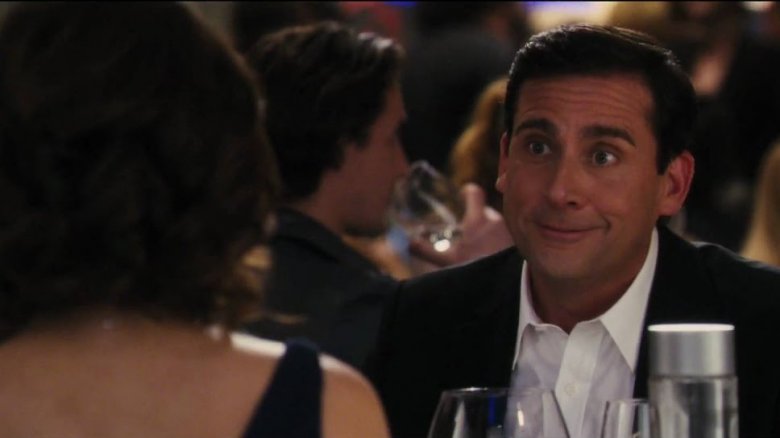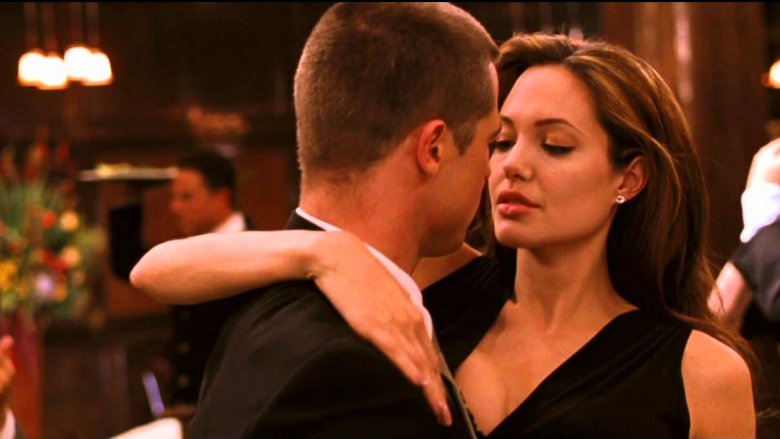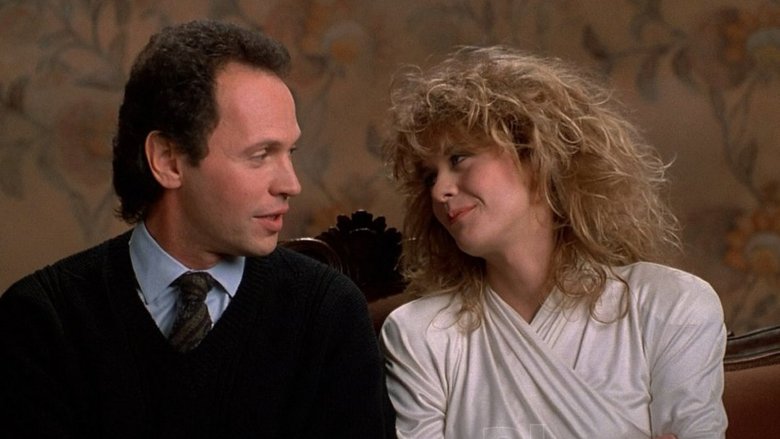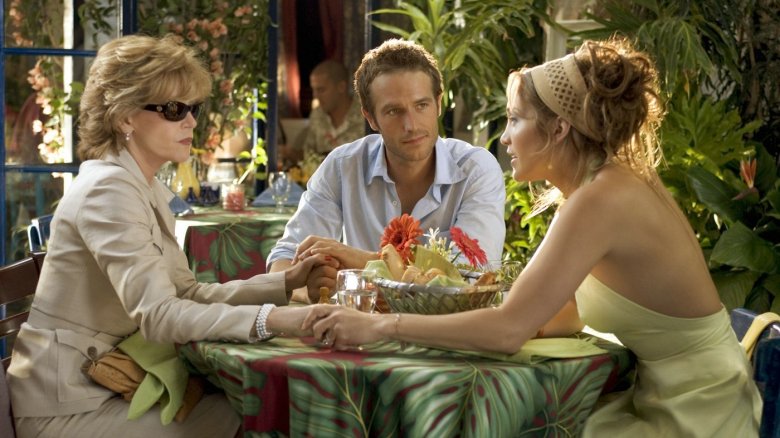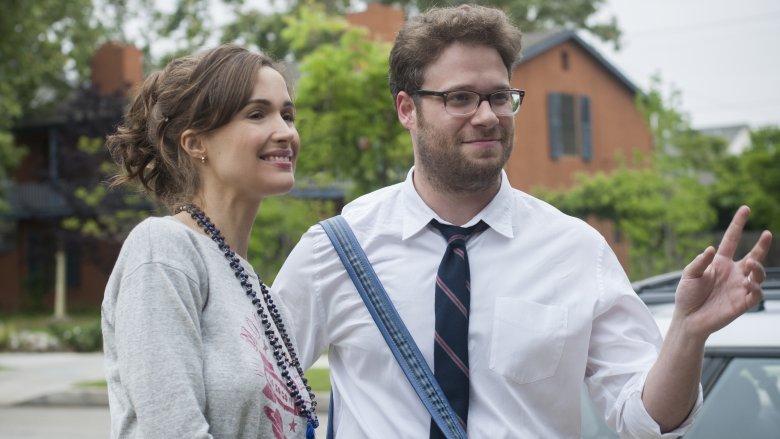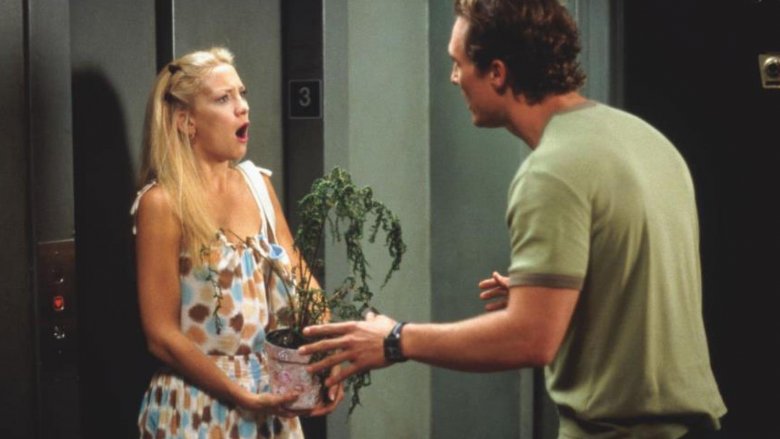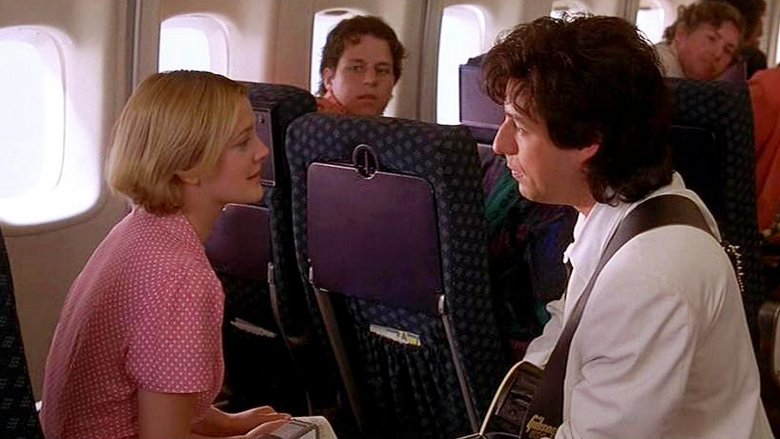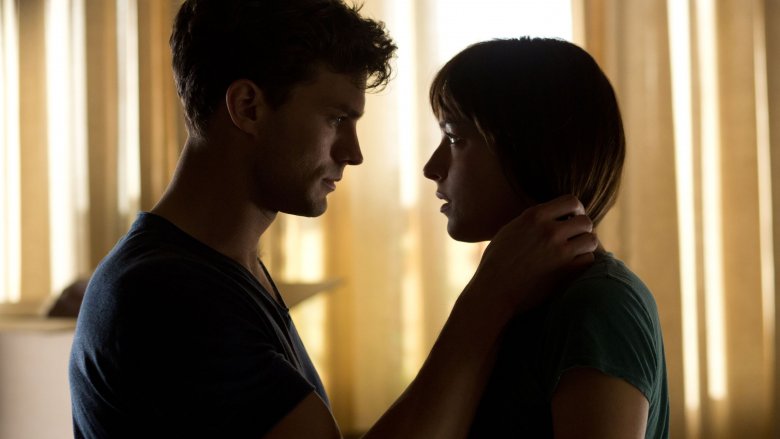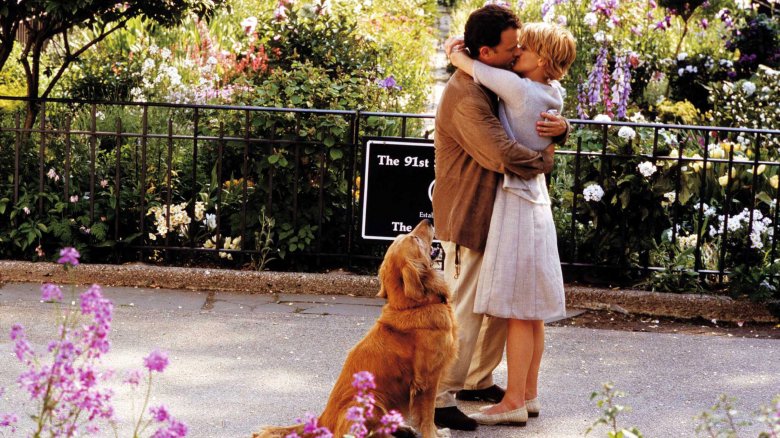Things Movies Always Get Wrong About Marriage
We're all guilty of having at least a few unrealistic expectations about marriage, but we might just have Hollywood to thank for our fairytale-like desires in the romance department. If you take a moment to think back on some of your favorite romantic dramas or comedies, you'll likely realize there are more than a few problematic tropes in each. This isn't to say you should boycott your favorite films. Rather, you might just want to remember that everything you see on screen is not quite what it seems.
The 2019 film Isn't It Romantic starring Rebel Wilson poked fun at some of the common themes in rom-coms, including kissing in the rain, dramatic voiceovers, and slow-motion running scenes — naturally. Although these cinematic additions to our favorite films may be innocuous enough, there are other dramatizations that carry a more questionable message. This is especially true when Hollywood depicts married couples or those in committed relationships. Here are some of the biggest things movies get wrong about real-life romance.
Spouses are responsible for each others' happiness
In order to be happy, every woman needs a partner, right? That is what Hollywood would have you think. "I believe movies, TV shows, magazines, and romance novels of the past half-century have done much to create the seriously flawed expectations couples take into marriage today," Stephen Arterburn, counselor and author of The 7 Minute Marriage Solution, wrote in his book, which was excerpted for an article for HuffPost. He continued, writing, "Studies show that most Americans (70 percent) believe the purpose of marriage is to find a mate who will make them happy."
If you expect your partner to make you happy, however, Arterburn explained that you'll be disappointed as happiness, as defined by many to be "consistently romantic feelings between soul mates whose sexual ecstasy lasts a lifetime," is just not practical.
Unfortunately, this trope is not only common in movies meant for adults, but also in children's films, like Disney's Cinderella. The main character for which the movie is named marries a prince to not only get out of a bad situation, but to also live happily ever after.
Falling in love happens instantly
Before getting married, many likely wait until they are sure they are in love. But most people's favorite films would have you believe that falling in love happens as soon as you lay eyes on a person. From Jack's longing glance at Rose in Titanic to Cady Heron practically melting when borrowing a pencil from Aaron Samuels in Mean Girls, the love-at-first-sight trope is a Hollywood favorite. In the film Big Fish, this theme is taken one step further as time quite literally stands still when Ewan McGregor's character Ed Bloom first sets his sights on a beautiful stranger. "I'm gonna find that girl, marry her, and spend the rest of my life with her," he announces shortly afterward. Well, that escalated quickly.
Mary-Lou Galician, a professor who teaches about media's portrayal of love for Arizona State University's Walter Cronkite School of Journalism and Mass Communication's online program, says love at first sight isn't actually possible. Lust, yes, but not love. She told the Chicago Tribune that Hollywood often speeds up how long it takes to fall in love for the sake of time. After all, many movies max out at anywhere from 112 to 156 minutes.
Only opposites attract
If you and your spouse aren't complete opposites, well, what were you thinking? There are plenty of films that follow this formula. In fact, Disney's Beauty and the Beast relies pretty much entirely on this trope — so much so that it's even depicted in the title. Danny and Sandy in Grease would also have us believe that relationships work best when you're nothing at all alike. After being sequestered in Saturday detention together, Claire Standish — "a beauty" — and John Bender — "a rebel" — discovered their differences drew them closer together in the '80s classic The Breakfast Club.
Other films like Pretty Woman depict people of vastly different social classes falling in love. In reality, Chauntelle Tibbals, a sociologist with a speciality in "gender, sexualities and popular culture studies" told the Chicago Tribune that social classes are "the great divider" in relationships. Outside of Hollywood, people who come from such different backgrounds aren't really all that likely to experience one of these fairytale romances depicted in so many films.
Spouses are mind-readers
As out there as telepathy may be, mind-reading is perhaps more prevalent in rom-coms than in sci-fi. Psychologists at Heriot Watt University in Edinburgh, Scotland studied dozens of top movies released from 1995 through 2005. Through questionnaires, the research team also had hundreds of volunteers sound off about their relationship expectations. What the researchers found when comparing the common themes used in the films to "regular" people's relationship expectations was pretty shocking.
According to The Telegraph, the researchers discovered that those who enjoyed the movies While You Were Sleeping, You've Got Mail, and The Wedding Planner had trouble effectively communicating with their partners. What's more is that many of these individuals believed their partners should be able to instinctively know their needs without ever having to share them. This form of mind-reading was not only prevalent in some of the volunteers' favorite rom-coms but also in many other films the researchers analyzed. Eek.
Soulmates are a thing
A 2011 Marist survey (via Psychology Today) revealed that almost three quarters of Americans believe in soulmates. Could Hollywood have had a role in perpetuating the idea that two people are destined to be together? That there's one person for everyone? Well, considering there's a movie quite literally named Serendipity about — you guessed it — serendipity, we're going to have to go with yes.
"There's a passivity in [destiny] thought," Craig Malkin, a clinical psychologist and an instructor of psychology at Harvard Medical School told the Chicago Tribune. "But love is participatory. You have to collaborate. You have to engage it. It doesn't just happen to us." People who understand that, the psychologist explained, tend to "have happier, longer relationships."
When films rely so heavily on the destiny storyline, they're really doing us all a disservice. According to Malkin, believing in "the one" puts the onus not on oneself, but on fate. As such, people believe they're not in control of their own relationships.
"Marriage is dull"
"Marriage has always been portrayed as the downside of weddings," Lois Smith Brady, author of the book Love Lessons: Twelve Real-Life Love Stories, wrote in an article for The New York Times. "Weddings are glamorous and usually involve weight loss; marriage is dull and involves weight gain. Every bride and bridegroom is beautiful; every husband and wife is exhausted."
Often a wedding will be featured at the end of the film — because obviously nothing exciting happens after the big day, right? When Hollywood does depict married life, it's much like Smith described. As hilarious as the film is, the 2009 comedy Date Night plays into the trope that couples, once married, basically become shells of who they used to be. At the outset of the movie, we're really supposed to believe that the most exciting thing Steve Carrell and Tina Fey's characters did after getting hitched was taking someone else's dinner reservation. Spontaneity is for the uncommitted, apparently.
Where's all that "boring stuff?"
Movies, especially romantic comedies, rarely account for nuance in relationships. While marriages aren't as dull as La La Land would have you believe, there are certainly unexciting parts of every relationship — married or not. Yet onscreen committed couples are either living a hyper-adventurous life together or living in a way that is wholly uneventful. Some films like Date Night and Mr. & Mrs. Smith show the couple transform from the first stereotype into the next, but, in Hollywood, there's no gray area. And, as it turns out, that's just not accurate.
"A real relationship is one where you take out the garbage, pay the bills and talk about your kids. A lot of it is really boring," clinical psychologist Reid Daitzman explained in an interview with Relevant magazine (via Mic). "What people don't realize, though, is that the best day of their lives includes all that boring stuff. Because when people don't have it, they really miss it." The reality is this kind of life probably won't make for a great summer blockbuster, but it does make for a great marriage.
Love will always find a way
Love is an important part of any romantic relationship, of course, but many films consider the emotion to be not a main component in a relationship, but often the only ingredient. And, as it turns out, that's a recipe for disaster. "Although you need love to get through the inevitable issues that will arise, there are too many instances where it is simply not enough to make a marriage work," Alisa Ruby Bash, a marriage and family therapist in Beverly Hills, Calif., explained to the Chicago Tribune. Our favorite films convince us that infidelity or resentment or any other host of issues can be solved by simply loving each other. If only.
In an interview with Rob Reiner, director of When Harry Met Sally, he revealed that his original plan for the film's ending did not involve a happily ever after for the couple. He explained to Entertainment Weekly that he had originally planned for Harry and Sally to "meet each other years later and then walk separate ways." Gasp. While it's hard to imagine love not conquering all in the ever-popular movie, it would've perhaps been more realistic.
Mothers-in-law are the worst
In-laws, especially mothers-in-law, get a bad rap. Actually, bad isn't a strong enough word. In Hollywood, mothers-in-law are often portrayed as downright evil. The 2005 rom-com Monster-in-Law, for example, features an unbearable, cruel mom whose main mission in life is to break up her son's relationship with his potential wife. And as much as we all love Sweet Home Alabama, it's worth mentioning that the film isn't quite so sweet when depicting Melanie's future mother-in-law. She's a comically snobby politician who doesn't agree with her son's decision to marry below his social class. Cringey, no?
Still, there is some truth to the overbearing mother-in-law stereotype. In a survey conducted by iVillage (via the New York Post), 28 percent of women reported having either a "bad" or "terrible" relationship with their mother-in-law. That is a troubling statistic, for sure, but it also means that over 70 percent of women surveyed don't have a monster-in-law.
Spouses are "always arguing and bickering"
Love conquering all may be the pervasive theme in romantic films, but that doesn't mean there won't be fighting. Endless amounts of fighting. When speaking with Kurt Andersen (via Public Radio International), actor and director Seth Rogen explained how changes were made to The Neighbors script to create not only a more realistic female character, but a more realistic marital dynamic.
"In early drafts of the script, [Rose Byrne's character] was cast aside as the nagging wife who was kind of trying to stop me and my friends from messing with the frat and having fun," Rogen revealed. After his wife, screenwriter Lauren Miller, read the script, she helped him see it wasn't a realistic depiction. The script then changed to, as Rogen explained, "portray a couple where the wife was just as fun-loving and irresponsible as the guy and that they got along really well." That in itself was a pretty new idea. "In a comedy, that is almost nonexistent — like an actual healthy couple that really likes each other," said Rogen. The star further said most films "like to portray marriage" as couples who "are always arguing and bickering."
Nonstop fighting is romantic
Not only is arguing common among rom-com couples, it's often used to show passion. Yes, in Hollywood, bickering is romantic. Mary-Lou Galician, a media professor at Arizona State University's Walter Cronkite School of Journalism and Mass Communication's online program, told the Chicago Tribune that this is a common formula used in films because conflict is needed to propel the plot.
Think of How to Lose a Guy in 10 Days. Despite all of the bickering and fighting, we still think of the film as romantic — even passionate. But this isn't realistic. Galician said it's important not to conflate fighting and passion in real life. A couple can be happy without fighting just the same as a couple who does argue can also still be happy.
Sometimes fighting in films even turns violent — something that is neither romantic nor funny in real life. Remember The War of the Roses? Hollywood depicted a horribly violent relationship, which involved throwing their spouses down the stairs and running them over with vehicles. It was meant to get a laugh, and it may have scored some at the time, but the overarching principle was beyond problematic.
Marriages don't take work
When's the last time you heard someone say "marriage is easy?" Never? Although maintaining a healthy relationship takes work, your fave films have probably convinced you otherwise. When researchers at Heriot Watt University in Edinburgh, Scotland studied the top films from the mid '90s to the mid-2000s and volunteers' expectations, they found something disconcerting. "Unfortunately people tend to believe the Hollywood idea of a perfect relationship," psychologist and lead researcher Bjarne Holmes told The Telegraph. "That is just unrealistic. People feel if their relationship is not like a Hollywood film then it is not any good."
While falling in love — and staying in love — is an effortless process onscreen, Holmes said real relationships take work. "Investing time and energy are not themes that are popular in Hollywood films," he explained. As such, we rarely get an accurate portrayal of a couple who works to keep their relationship thriving.
As Adam Sandler demonstrated by way of song in The Wedding Singer, marital problems can be solved by letting your spouse "hold the remote control" or lending a coat "when you are cold." If only growing old together was quite that easy.
Sex is either always "perfect" or nonexistent
Love scenes in films have given us all unrealistic expectations when it comes to sex. And we're not just talking 50 Shades of Grey. No, films pretty much always portray sex in a way that isn't realistic. From movies like the aforementioned Date Night, in which the married couple seemingly almost never has sex, to Mr. & Mrs. Smith, which features plenty of bad Hollywood tropes plus an entirely impractical love scene complete with violence.
Although you may know full well that Hollywood has taken some liberties when depicting onscreen intimacy, psychologist Bjarne Holmes thinks these dramatizations do cause us to have unrealistic expectations. In an interview with The Telegraph, he explained, "Marriage counsellors often see couples who believe that sex should always be perfect."
Still, there are those of the opinion that Hollywood lovemaking shouldn't be unrealistic. Stuart Heritage, film writer for The Guardian, wrote, "If sex on screen were in any way representative of what sex is like in real life, it'd be miserable to watch. Films would need to come with sick bags and disclaimers warning viewers against scenes that may cause shame and guilt."
What's divorce anyway?
Most of the best rom-coms end with a happily ever after. In You've Got Mail, the movie fades out with Joe Fox and Kathleen Kelly kissing and embracing. It's a sweet ending, and, in our minds, we've worked out that the two will go on to get married and live happily ever after. But will they? Maybe, maybe not.
Chauntelle Tibbals, a sociologist who specializes in gender and popular culture, told the Chicago Tribune, "Reality is not so seamless." She explained, "Tragedy happens. Life happens. People just grow in different directions." According to the American Psychological Association, around 40 to 50 percent of marriages in the United States will end in divorce. As such, you'd think there'd be at least a few more films on the topic.
Even when divorce is included in a storyline, there are still issues. Harry's divorce in When Harry Met Sally is not central to the plot. Instead, it's about him finding a happily ever after with someone else. In Sweet Home Alabama, Melanie's husband refuses to sign divorce papers — because that's romantic? — and they end up getting back together. Hollywood certainly has some work to do.
